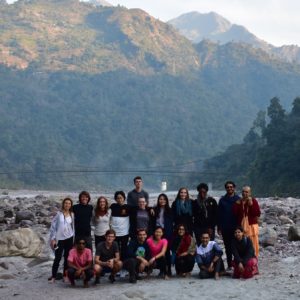
It’s hard to believe, but this is my last post of my sophomore year. This PCUR “ending,” however, comes at a time when I’m still in the middle of working on Dean’s Date assignments and (thinking about) preparing for final exams, so there’s something a little dissonant about writing a reflection post right now. Indeed, I suspect that only after the last exam wraps up, or after I move home and begin my summer job, will I be able to reflect more fully on my sophomore year. Nevertheless, I do have some preliminary observations, which I hope others will find useful as they take stock of their own personal and academic progress this year.
For me, this year has been full of unexpected developments. In September of 2017, I would not have guessed that I’d be spending Christmas in Mumbai or declaring Religion as my concentration. Yet, both of these things happened. In this post, I’ll use these two episodes as case studies to speak to a larger theme of the year: flexibility, which I’ll define as the ability to change plans in light of changing circumstances and/or preferences.
Let’s start with Christmas in Mumbai—how’d that happen, and what did that have to do with flexibility? In the fall, I learned about the Office of Religious Life Yoga and Meditation Fellowship (which included the trip to India) through a flier that I saw while walking through Firestone plaza. That chance event set me on a path of tremendous personal growth and learning. Funnily enough, though, I initially didn’t think the program would be a good fit for me—how could I miss Christmas and New Year’s celebrations with my family? Like many people, I felt that winter break was family time, which I value highly. It took some deeper, more open-minded thinking for me to realize that I actually could spend the holidays away from my family, and that the experience could be good for me. (In hindsight, it was!) Maintaining an open mind gave me the flexibility to reevaluate a tradition that felt compulsory—going home for winter break—and to consider going on an exciting adventure instead.
Flexibility also played a major role in my concentration decision. As regular PCUR readers may know, I spent the majority of my first two years at Princeton thinking I’d study History or Politics. I took (and enjoyed!) classes in those departments, talked with upperclassmen students about independent work, and even got to know a few professors in those fields. Religion was hardly on my radar in September 2017. Yet, over the course of first semester, as I prepared to go to India, I gained more exposure to the academic study of religion. (One particularly insightful book was Huston Smith’s The World’s Religions, which provides a thoughtful introduction to major world religions.)
After returning from India, I decided to check out classes in the religion department, and ultimately to enroll in REL 251: Christianity in the Early Roman Empire. I enjoyed my religion course, but even as declaration day drew near, I still thought I was set on History. After some relatively last-minute research on what the religion department was really like, however, I realized that it would be a great fit. (Reasons include the religion department’s small size and openness to independent work focused on contemporary issues.) Declaring a different concentration than expected isn’t a momentous event, but just like the decision to go to India, it was the product of open-mindedness and a willingness to change plans.
One personal takeaway from these two sophomore year episodes is that I should strive for open-mindedness and flexibility going forward. I’ll be the first to admit that this is a tall order. Like many virtues, flexibility and open-mindedness are perpetual works in progress, not set goals that can be checked off a list. I hope that readers will join me in working toward difficult personal goals like this, though, because I’m convinced that they are key to personal growth. And, if you stay flexible, you too might spend New Year’s at a sustainable eco-village in the Indian countryside!
Have a great summer, Princeton.
–Shanon FitzGerald, Social Sciences Correspondent

